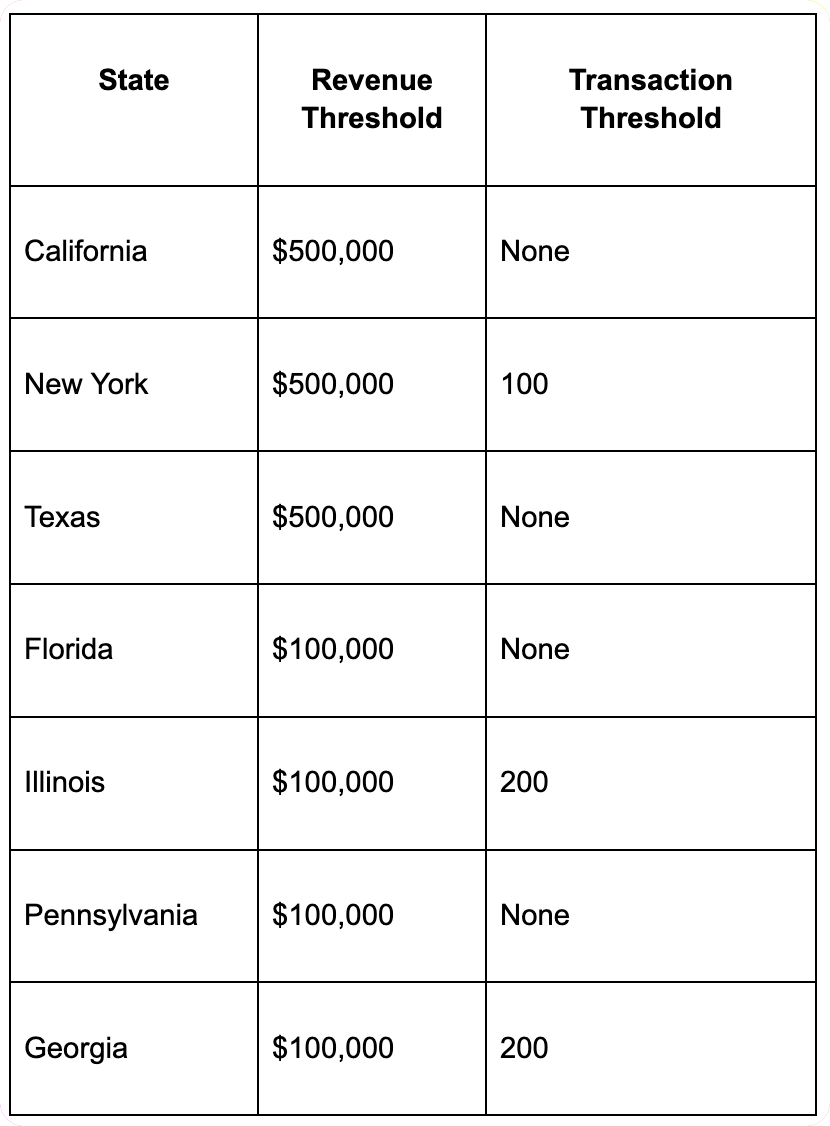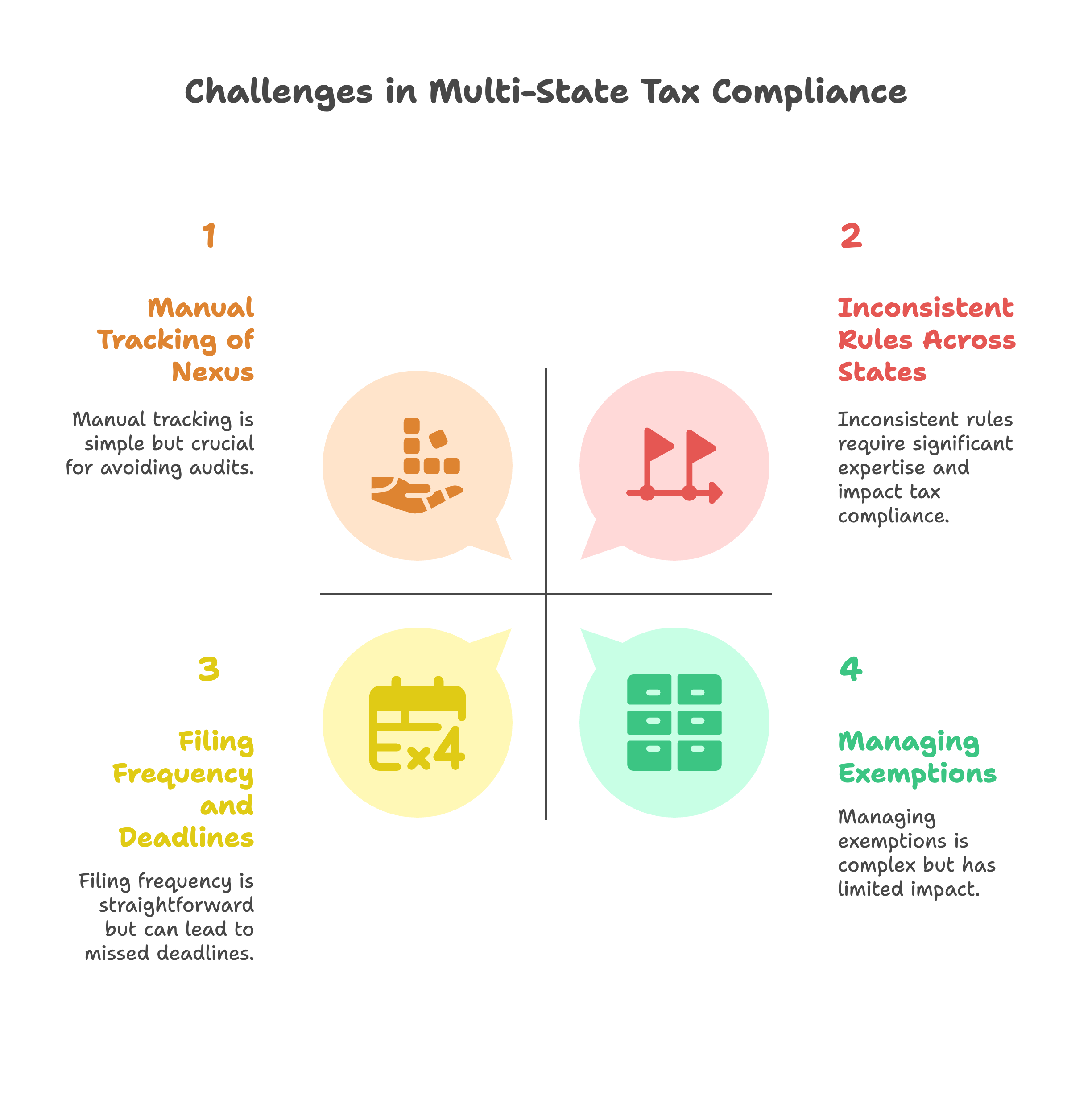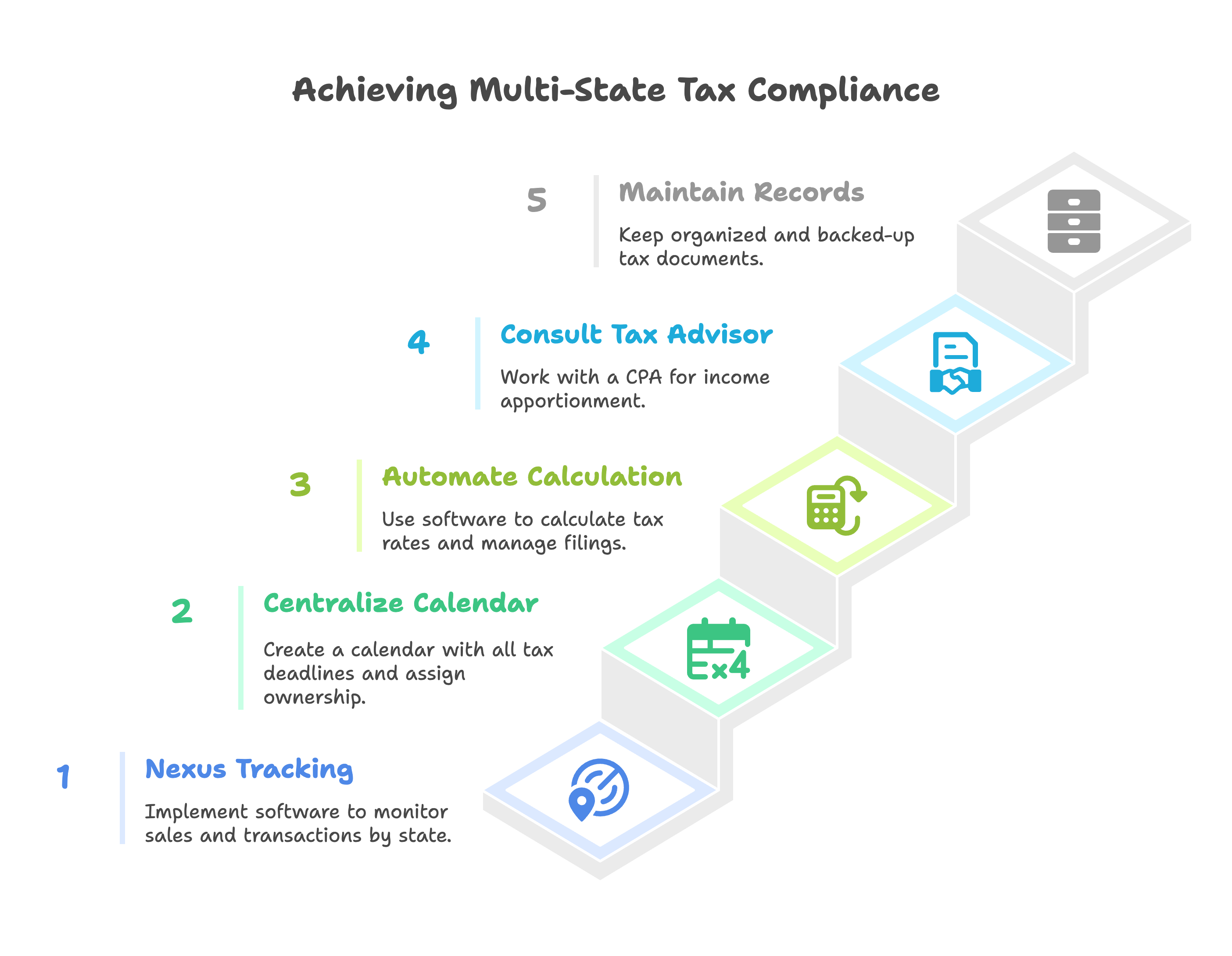Expanding your business into new states is exciting. It signals growth, broader customer reach, and higher revenue potential. But it also brings something most businesses are unprepared for - multi-state tax obligations.
Each U.S. state operates its own tax system. Sales tax rates differ. Income tax requirements vary. Even what counts as doing business in a state changes depending on the local tax law. What worked when you only operated in Texas won't apply once you start shipping to California or hiring remote workers in New York.
This guide breaks down what you need to know about multi-state tax compliance. Whether you are an e-commerce brand, SaaS business, or a professional service firm scaling across multiple states, understanding your state-by-state tax obligations is critical. Non-compliance doesn't just mean penalties. It can affect your ability to raise funds, sell your business, or pass due diligence.
Let's walk through nexus, tax types, registration, common mistakes, and how to simplify your tax posture as you grow.
The term "nexus" refers to the connection between your business and a particular state that creates a legal obligation to collect or pay taxes in that state. There are two main types:
Sales tax nexus is created when your business has sufficient presence in a state. That presence can be:
After the 2018 Supreme Court decision in South Dakota v. Wayfair, states gained the ability to enforce sales tax based on economic nexus. This means that even if you have no office or employee in a state, you might still be required to collect and remit sales tax if your sales volume or transaction count crosses their thresholds.
Income tax nexus is typically triggered by:
Once nexus is established, you may need to file a state income tax return and allocate part of your income to that jurisdiction.
Here is a quick snapshot of sales tax economic nexus thresholds across popular states. Always verify with the state's tax authority, as these tax regulations can change.

If you cross the threshold in any of these states within a calendar year, you business must register to collect sales tax and begin filing returns.
Each state has its own tax landscape. You may be liable for one or more of the following:
You collect sales tax from customers and remit it to the state. Use tax applies when goods are purchased tax-free (e.g. from out-of-state suppliers) but consumed in the state.
Not all states tax the same goods and services. Some tax digital products. Others do not. SaaS companies often face confusion here due to varying tax rate structures and use tax requirements.
If your business has income tax nexus, you must file a tax return and allocate income using apportionment formulas. These formulas consider:
Different states use different weighting methods, which can significantly impact your tax bill.
Some states levy a tax for the right to do business in the state, regardless of profitability. For example:
These are separate from income taxes and may apply even if your business is not profitable.
Hiring an employee or contractor in a state usually triggers payroll tax obligations. This includes:
This applies even for remote workers and can affect your HR and payroll systems.
You should register with a state's tax authority when you:
Registration is generally required before collecting sales tax. Never collect and remit sales without being officially registered, as doing so can lead to legal issues.
Most states allow you to register online through their Department of Revenue website. Some also participate in the Streamlined Sales Tax (SST) program, which simplifies registration for multiple states.
Every state has its own thresholds, rules, and taxability laws. For example, digital products are taxed in Pennsylvania but not in Oregon. Shipping is taxable in Illinois but not in California. Understanding these variations in tax law across multiple states requires significant expertise.
Tracking sales or transaction counts across states manually is tedious and error-prone. Many businesses only realize they triggered nexus after an audit or inquiry letter.
Some states require monthly sales tax filings. Others are quarterly or annually. Income tax returns are due at different times in different states. Managing these deadlines without a system leads to late fees and missed filings.
Filing income tax in multiple states requires dividing your income based on complex formulas. These differ by state and are not standardized.
If you sell to wholesalers or tax-exempt entities, you must collect and maintain valid resale or exemption certificates. Mistakes here can lead to tax assessments and penalties.

Software like Avalara, TaxJar, or Sovos can track your sales and transactions by state. These tools alert you when you approach or cross thresholds so you can register on time and maintain sales tax compliance.
Create a calendar with all state filing deadlines, estimated payment schedules, and renewal dates. Assign ownership to your finance or compliance team to ensure all tax requirements are met.
Use tax calculation software that integrates with your checkout or invoicing systems. These tools calculate the correct tax rate, apply tax holidays or exemptions, and manage filings.
If you generate revenue in multiple states, work with a CPA familiar with multi-state apportionment. This helps avoid double taxation and ensures accurate income allocation.
Save every tax return, payment confirmation, exemption certificate, and nexus determination letter. Keep them organized and backed up in case of audits.
Successful multi-state tax compliance requires a combination of the right tools, processes, and expertise. Here are key compliance strategies to consider:
Modern businesses need integrated systems that can handle complex tax rate calculations across different jurisdictions. This is especially important for companies selling across multiple states where use tax and sales tax rules vary significantly.
Conduct quarterly reviews of your nexus exposure and tax obligations in each state where you operate. This proactive approach helps identify new requirements before they become compliance issues.
Working with tax professionals who understand state tax complexities can help businesses navigate the ever-changing landscape of tax regulations and requirements.

If you operate in more than three states or are adding new states regularly, consider outsourcing this function. An experienced accounting partner can:
The business needs of growing companies often exceed internal capabilities, especially when it comes to complex multi-state tax compliance. Outsourcing can help businesses maintain compliance while focusing on core operations.
Madras Accountancy works with small and mid-sized CPA firms and business owners to manage tax compliance across all 50 states. Our offshore tax teams are trained in U.S. state-level laws, deadlines, and systems. We plug into your workflow and reduce the internal bandwidth needed to stay compliant.
Each state's approach to taxation creates unique challenges for businesses operating across multiple states:
The complexity of sales tax compliance extends beyond just different tax rates. States have varying rules about what products and services are taxable, how to handle exemptions, and when businesses must collect and remit sales tax.
State income tax requirements can be particularly complex for businesses with operations across multiple states. Understanding how different states calculate apportionment and what constitutes taxable income in each jurisdiction is crucial for accurate compliance.
Payroll tax requirements vary significantly by state, and businesses must understand both state income tax withholding obligations and unemployment insurance requirements for employees working in different states.
Professional tax services can help businesses in several key ways:
These services are particularly valuable for businesses that need to help businesses navigate the complexity of multi-state operations while maintaining focus on growth and core business activities.
Multi-state tax compliance is not optional once your business begins selling, hiring, or operating across state lines. From sales tax collection to income allocation and payroll obligations, each new state introduces a layer of complexity that can't be ignored.
Without the right systems and advisors in place, it is easy to fall out of compliance. The consequences range from interest and penalties to missed funding opportunities and reputational risks.
By using tools to monitor nexus, automating filings, and working with experts who understand the rules in each jurisdiction, you can scale your business with confidence. You stay focused on growth while your tax compliance runs smoothly in the background.
Understanding your tax obligations across multiple states is essential for any growing business. Whether dealing with sales tax rates, use tax requirements, or complex income tax apportionment, having the right compliance strategies in place ensures your business can expand without unnecessary risk.
Madras Accountancy helps U.S. businesses and CPA firms maintain compliance across state lines without adding internal workload. If your business is growing and you want to stay ahead of tax obligations, we can help businesses navigate these complex requirements efficiently and effectively.
Question: What creates tax nexus for businesses operating in multiple states?
Answer: Tax nexus is created through physical presence including offices, warehouses, employees, or inventory storage, as well as economic nexus thresholds based on sales revenue or transaction volumes in each state. Physical nexus includes temporary activities like trade shows, remote employees, and third-party representatives conducting business activities. Economic nexus typically requires $100,000-500,000 in annual sales or 200+ transactions depending on state requirements. Marketplace facilitator laws may create nexus through third-party sales platforms. Click-through nexus applies when in-state affiliates generate referrals exceeding specified thresholds. Understanding nexus rules is crucial as they determine filing obligations, tax collection requirements, and compliance responsibilities across multiple jurisdictions.
Question: What are the key compliance requirements for businesses with multi-state operations?
Answer: Multi-state compliance requirements include income tax filing in states where nexus exists, sales tax registration and collection where required, payroll tax compliance for employees in each state, and property tax filings for business assets. Income tax obligations include apportionment of business income, allocation of non-business income, and compliance with various state filing requirements. Sales tax compliance involves registration, collection, remittance, and exemption certificate management. Payroll obligations include withholding, unemployment insurance, and workers' compensation compliance. Additional requirements may include franchise taxes, gross receipts taxes, and local business licenses. Each state has different rules, forms, deadlines, and penalties requiring careful coordination and monitoring.
Question: How should businesses handle income tax apportionment across multiple states?
Answer: Income tax apportionment divides business income among states based on formulas considering sales, property, and payroll factors, though many states now use single-factor sales formulas. Calculate apportionment percentages using state-specific formulas, determine sourcing rules for sales (destination vs. origin), and apply throwback rules for sales to non-taxing states. Consider market-based sourcing for service revenues and special apportionment rules for specific industries. Maintain detailed records supporting apportionment calculations including sales by state, property locations and values, and payroll by location. Professional assistance helps navigate complex apportionment rules, minimize overall tax burden, and ensure compliance across all jurisdictions where filing obligations exist.
Question: What sales tax obligations apply to businesses selling across state lines?
Answer: Businesses selling across state lines must register for sales tax in states where they have nexus, collect appropriate tax rates based on destination addresses, and remit taxes according to each state's filing schedule. Economic nexus thresholds require registration and collection even without physical presence in many states. Use automated tax calculation software to handle varying rates, local taxes, and product-specific exemptions. Maintain exemption certificates from resellers and tax-exempt customers, and implement proper invoicing and record-keeping procedures. Consider marketplace facilitator rules that may handle collection for third-party sales. Regular nexus monitoring helps identify new obligations as business activities expand into additional states.
Question: How can businesses efficiently manage multi-state payroll tax compliance?
Answer: Manage multi-state payroll tax compliance through centralized payroll systems, automated state tax calculations, and systematic monitoring of employee work locations. Register for payroll taxes in states where employees work, implement proper withholding for resident and non-resident employees, and comply with reciprocity agreements between states. Track temporary work assignments that may create nexus, maintain detailed records of employee work locations, and handle unemployment insurance registration and reporting. Consider telecommuting policies' impact on tax obligations and implement systems for tracking remote work locations. Professional payroll services often provide multi-state expertise and automated compliance to reduce administrative burden and ensure accuracy.
Question: What are the common challenges in multi-state tax compliance and how can they be addressed?
Answer: Common multi-state tax challenges include keeping current with changing state laws, managing different filing deadlines and requirements, maintaining adequate records, and coordinating compliance across jurisdictions. Address challenges through automated compliance software, professional assistance for complex situations, centralized record-keeping systems, and regular training on state tax requirements. Implement nexus monitoring procedures, maintain current state law resources, and establish systematic compliance calendars. Consider outsourcing complex compliance functions, using technology for automated calculations and filings, and maintaining relationships with state tax professionals in key jurisdictions. Regular compliance reviews help identify and correct issues before they become significant problems.
Question: How should businesses approach voluntary disclosure for past multi-state tax non-compliance?
Answer: Voluntary disclosure programs allow businesses to come forward voluntarily to resolve past non-compliance with reduced penalties and limited lookback periods. Most states offer voluntary disclosure agreements (VDAs) providing penalty relief and lookback limitations of 3-4 years versus unlimited liability for willful non-compliance. Consider voluntary disclosure when nexus analysis reveals past filing obligations, significant tax liabilities exist from non-compliance, or businesses want to clean up compliance before audits or transactions. Work with experienced tax professionals to negotiate favorable terms, minimize liabilities, and ensure ongoing compliance. Voluntary disclosure often provides the most cost-effective resolution for past compliance issues while establishing proper ongoing procedures.
Question: What technology solutions can help streamline multi-state tax compliance?
Answer: Technology solutions for multi-state tax compliance include automated tax calculation software, integrated compliance platforms, and cloud-based filing systems that handle multiple jurisdictions simultaneously. Leading solutions include Avalara, Vertex, TaxJar, and CCH SureTax for sales tax automation, and Thomson Reuters ONESOURCE or Sovos for income tax compliance. These platforms provide real-time tax calculations, automated filing and remittance, nexus monitoring, and exemption certificate management. Integration with accounting and ERP systems reduces manual data entry and improves accuracy. Consider features like address validation, rate updates, audit trail capabilities, and multi-state reporting when selecting technology solutions. Proper implementation and ongoing maintenance ensure optimal performance and compliance across all jurisdictions.

A practical comparison of hiring a freelancer vs using a dedicated offshore accounting team, focusing on continuity, quality control, security, and scaling.

How CPA firms outsource payroll and 1099 work to reduce penalties and admin load, with a clean workflow for approvals, filings, and year-end reporting.

Practical do's and don'ts for CPA firms outsourcing accounting work, based on common failure points and what successful rollouts do differently.